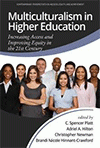
Multiculturalism in Higher Education
Increasing Access and Improving Equity in the 21st Century
Edited by:
C. Spencer Platt, University of South Carolina
Adriel A. Hilton, Southern University at New Orleans
Christopher Newman, Azusa Pacific University
Brandi Hinnant-Crawford, Western Carolina University
A volume in the series: Contemporary Perspectives on Access, Equity, and Achievement. Editor(s): Chance W. Lewis, University of North Carolina at Charlotte.
Published 2020
As the educational landscape of America continues to evolve and diversify, college faculty and administrators must be cutting edge in their approaches to create a variety of educational experiences with a greater level of multicultural cognizance. Unlike in previous generations, higher education in the 21st Century is no longer a luxury reserved for the elite and wealthy, but is an increasing necessity for access to labor markets. Community colleges and universities are working hard to respond to the demands of the labor market, by attempting to provide skills for jobs that may not yet exist.
Colleges and universities should aim to make all of their students feel welcome and a part of the campus being committed to celebrating differences. Additionally, filling faculty seats with varied races, cultures, perspectives and identities will aid in providing mentors and role models everyone can relate to. These are some of the vital steps toward building a campus community that helps students develop a sense of belonging that allows them to persist and thrive in college.
The scholarship in this volume illustrates the state of multicultural education on college and university campuses. The authors bridge foundational knowledge with contemporary understandings; making the work both accessible for novices and beneficial for the authorities on multicultural education. This volume provides thoughtful discourse on issues ranging from the racial and ethnic diversity of the student and faculty bodies, and important topics like disability issues, to different educational contexts such as community colleges, HBCUs and HSI institutions.
CONTENTS
Acknowledgments. Introduction—The 21st Century Global Society: Adapting to the Changing Demographic on Today’s College Campuses. Merging Cultural Diversity and Academic Quality to (Re) Envision 21st Century College Campuses: The Promise and Power of Culturally Relevant High-Impact Practices in Promoting Racial Equity in Higher Education, Samuel Museus, Ting-Han Chang, and John Zilvinskis. Why Professor and Student Identities Matter in Diversity in Higher Education Courses, Thandi Sulè, Rachelle Winkle-Wagner, and Dina C. Maramba. Multiculturalism in STEM: An Analysis of Theories That Guide This Research, Tonisha B. Lane, Blanca Rincón, Renata A. Revelo, and Kali Morgan. “Learning in Depth”: Themed First Year Composition Courses as Contemplative Focusing Strategies for the Overly Stimulated 21st Century Writing Student, Kendra N. Bryant. Black Male Honors: The Experiences of Black Males in the Honors College, Sandra Greene and C. Spencer Platt. Ease on Down the Road: Navigating the Yellow Brick Road to Graduation at a Primarily White Institution (PWI), Kristopher G. Hall and Christopher B. Newman. Embracing Change: The Importance of Pluralism at Historically Black Colleges and Universities, Larry J. Walker, Ramon B. Goings, Dorsey Spencer, Jr., Stacey McDonald-Lowe, and Robert T. Palmer. Multicultural Education and Diversity Outcomes at Historically Black Colleges and Universities (HBCUs), Megan Covington, Kevin McClain, Brighid Dwyer, and Adriel A. Hilton. Bridging the Gap Between Research and Practice: Empowering Latinx Male Students Through Service-Learning and Mentoring, Victor B. Sáenz, Jorge Segovia, José Del Real Viramontes, Juan Lopez, and Jorge Rodriguez. Exploring the Racialized Contexts that Shaped the Emergence of Hispanic Serving Institutions (HSIs) in Chicago: Implications for Research and Practice, Gina A. Garcia and Lisanne T. Hudson. The Higher Education Disability Experience, Warren E. Whitaker. Thoughts on Equity and California Community Colleges, Darrick Smith. The Value of Intentional and Mindful Global Immersion Experiences for Multicultural Awareness, Cheryl Getz. Knowing Beyond the Boundaries: The Ongoing Possibilities for the Use of Transgressive Teaching in Out-of-Classroom Learning Spaces in Higher Education, Conor P. McLaughlin.
-
Paperback978-1-64802-007-0
Web price: $45.04 (Reg. 52.99)
-
Hardcover978-1-64802-008-7
Web price: $80.74 (Reg. 94.99)
- eBook978-1-64802-009-4

- EDU048000 - EDUCATION: Inclusive Education
- EDU020000 - EDUCATION: Multicultural Education
- EDU015000 - EDUCATION: Higher
-
 Advancing Inclusive Excellence in Higher Education
Practical Approaches to Promoting Diversity, Equity, Inclusion, and Belonging
Advancing Inclusive Excellence in Higher Education
Practical Approaches to Promoting Diversity, Equity, Inclusion, and Belonging
-
 Developing Culturally Responsive Learning Environments in Postsecondary Education
Developing Culturally Responsive Learning Environments in Postsecondary Education
-
 Economic, Political and Legal Solutions to Critical Issues in Urban Education and Implications for Teacher Preparation
Economic, Political and Legal Solutions to Critical Issues in Urban Education and Implications for Teacher Preparation
-
 Imagining the Future
Historically Black Colleges and Universities - A Matter of Survival
Imagining the Future
Historically Black Colleges and Universities - A Matter of Survival
-
 Post-Secondary Planning for All
Approaches to College and Career Readiness Counseling for Special Populations
Post-Secondary Planning for All
Approaches to College and Career Readiness Counseling for Special Populations
-
 Preparing to Lead
Narratives of Aspiring School Leaders in a "Post"-COVID World
Preparing to Lead
Narratives of Aspiring School Leaders in a "Post"-COVID World
-
 Unveiling the Cloak of Invisibility
Why Black Males are Absent in STEM Disciplines
Unveiling the Cloak of Invisibility
Why Black Males are Absent in STEM Disciplines

